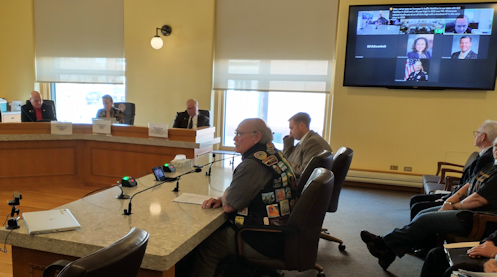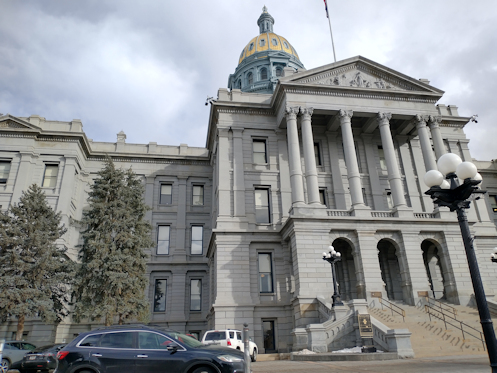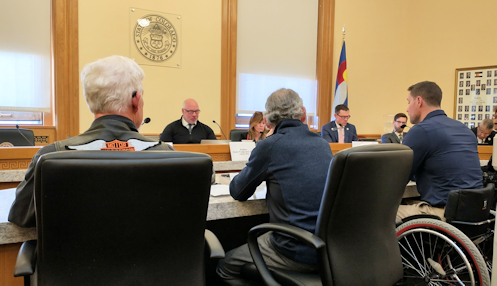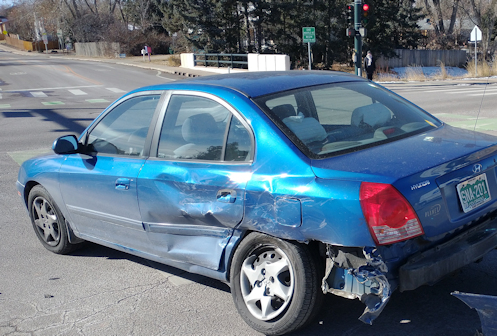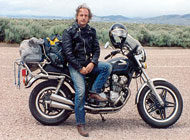Hearing On Hands-Free Bill Bumped To Next Week
Thursday, April 4th, 2024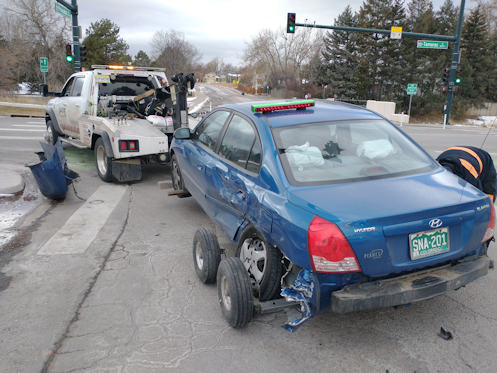
This happened to me. We need to do what we can to make sure it doesn’t happen to you or someone you love.
The Colorado House hearing on SB24-065 (Use of Mobile Electronic Devices While Driving) was postponed from Wednesday of this week to Tuesday of next week. It will be held on Tuesday, April 9, in the Legislative Services Building located at 200 E. 14th Avenue, directly south of the Capitol. However, the time is now a bit uncertain because instead of 1:30 p.m. as initially announced, it will take place “upon adjournment,” meaning that right after the main House session adjourns for the day the committee will cross the street and hold the hearing. Upon adjournment could mean as early as 9:30 a.m. This could get tricky.
This is the big one. This bill needs to pass. The idiots out there who think their phone calls are more important than our lives–like the guy who T-boned me on January 18–need to be served notice that this will no longer be tolerated. It happened with drinking and driving. The Mothers Against Drunk Driving group raised a ruckus and this country finally came to the realization that drinking and driving was a deadly hazard to each and every one of us and public attitudes changed. It’s happening with cellphone use while driving and it’s happening here in Colorado next week.
I really don’t know if there will be opposition to this bill. There was none when it passed through the Senate but the last time it was up for consideration there were opponents arguing that it would unfairly affect poorer people who would be less likely to be able to afford the fines.
Will that argument be raised again this time? Because that is such a piece of BS that I will absolutely speak out to counter. First off, avoiding such fines is an extremely simple matter: just don’t use your damn phone while driving. You don’t even have to do anything to avoid a fine, you just do nothing. You just obey the law.
More than that, what about the poor people who are the victims of the distracted drivers? Don’t they count? When they get injured or their cars get totaled because some fool ran a red light and crashed into them they incur real expenses. Hospital bills. Time lost at work. Repairs or a new car. Heck, I had insurance but it paid me a pittance, so when I replaced my totaled car I bought a used one and had to put up an additional $10,000 on top of the insurance money to pay for it. All because some guy I never met and probably would never have known existed felt that his phone call was more important than safely operating the 3,500-pound vehicle he was supposed to be driving.
And I consider myself absolutely blessed because although my car was trashed I was completely uninjured. But how long does it take a car going 15-20 miles an hour (mine) to go two feet? What fraction of a second is that? Because that fraction of a second was the difference between this guy smashing into the back half of my car and not directly into where I was sitting in the driver’s seat. And he was speeding. He hit me hard. The collision tore open the rear end of my car so that although the trunk lid was still closed, tools from my trunk were strewn across the road.
I have supported this bill every time it has come up in recent years but now it’s personal. We have got to get this bill passed. I know people will still use their phones–some of them at least–but with the passage of this law they will know what they are doing is wrong and that will deter at least some of them. And for those it does not deter, they will pay a heavier price. Not heavy enough, but we can worry about raising the penalties later, once we get the general law enacted.
I urge as many of you as possible to show up on Tuesday to support this bill.
Biker Quote for Today
You know you’re a biker when you want to be buried with your bike because you’re not done riding yet.

